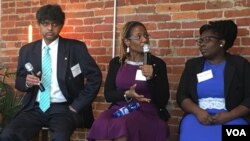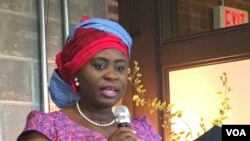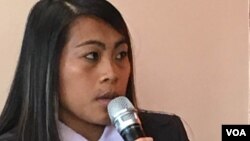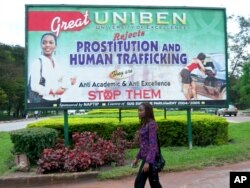Members of a unique U.S. government advisory panel — all of them victims of human trafficking — are calling for significant changes in the way authorities engage with those who have been rescued from slavery and exploitation.
More extensive and uniform training for law enforcement, comprehensive government services for all survivors, and funding to empower survivor leadership and empowerment are among the recommendations by the 11-member U.S. Advisory Council on Human Trafficking.
The first report of the all-volunteer council, composed of eight women and three men, was released Tuesday. Its members, at a public event in Washington's Chinatown district, called for greater awareness about the war on human trafficking, which they say is a lucrative, global criminal enterprise.
While Asia is recognized as a significant region for the modern-day slave trade, there also are an unrealized number of victims in and from Africa.
Africa's "culture doesn't encourage speaking out. You can't say it to your next door neighbor; you can't say it to your friend. So in that situation it's hard to get statistics," council secretary Bukola Love Oriola, originally from Nigeria, told VOA.
Vietnamese American Minh Dang, whose parents sold her for sex from age 10, said there frequently is a single narrative about what constitutes human trafficking.
"There can be an overemphasis on the commercial sex industry, or an overemphasis on this as an international issue," she told VOA. "This happens in all industries in all countries. The U.S. is trafficking its own people and trafficking foreigners."
At the core of it, in the United States and elsewhere, Minh laments, is "an economy that demands cheap or no cost labor. We are OK with building an economy on peoples' backs and not paying them."
Long-term support crucial
Law enforcement and other aspects of society too frequently believe that once victims are rescued, the responsibility to assist them ends. But council members say years of support from society, usually including housing and mental health counseling, are crucial.
"I don't know how to share my pain," said council co-chair Harold D'Souza, who as a child was part of a family from India that was subject to labor bondage in a Cincinnati-area restaurant.
"When I'm alone, I'm crying. I break down. I feel ashamed of myself," added D'Souza, who now is a husband and father of two sons.
"Human trafficking changes the life of the victim forever," said council member Flor Molina, who was trafficked from Mexico into a Los Angeles garment factory.
Even family members don't understand "why we are so afraid," Molina explained at the event.
Council member Evelyn Chumbow, originally from Cameroon, was held in personal slavery by a recruiter in the United States from the age of seven until 17. Chumbow appealed to the U.S. government to "take these recommendations we have given and really implement them."
Council recommendations
The council recommends law enforcers and others involved in combating the $150 billion industry receive training from actual survivors of human trafficking about the complexities of the crimes.
The report also requests improved training for members of the Association of Club Executives, a trade association of adult nightclubs in the United States. And it recommends that club owners receive additional awareness training with updated materials and the establishment of a program to monitor the effectiveness of their efforts.
The council was established by the Obama administration in December 2015 to provide a formal platform for survivors to provide expertise to federal agencies on the U.S. anti-trafficking policy.
The council's establishment has helped create awareness that "human trafficking could happen to anyone," said member Ronny Marty, who was trafficked from the Dominican Republic into an Alabama manufacturing plant.
"The fact that survivors are engaging with the federal government on this level is truly amazing," remarked council co-chair Sheila White, who was forced into sex work as a child.








